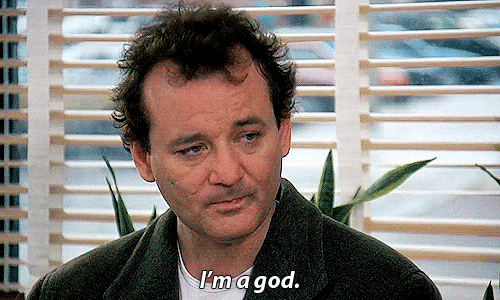
“I’m a god. I’m not “the* god. I don’t think…”–TV meteorologist Phil Connors, in Groundhog Day
Your alarm buzzed, you woke up and looked at the clock and then realized this was not an ordinary Sunday. There’s a good chance you are in Atlanta, but that’s not the only reason it feels special today. Rather, it is because you are not just anyone: you are a person in the atmospheric or related sciences about to enjoy a rare opportunity to spend this recurring February prognosticators’ headache called “Groundhog Day” together with a few thousand of your closest colleagues.
This god-like feeling is only possible because the AMS meeting schedule bumped the annual gathering into February 2—a rarity, indeed. (On the heels of the recent, not-in-70,000-year Thanksgivvukah, the scheduling deity is on a roll!)
But is that why you feel like a god? Here are some other possible explanations for the wings on your shoes and the trident in your suitcase:
- Punxsutawney Phil has done a live forecast on an early morning wake-up slot once a year since at least 1886. That’s impressive longevity, even for a rodent, but real meteorologists work all time slots—morning commute, midday, evening drive, evenings and weekends in markets way bigger than the Nielsen ranked 101st in the country. Gary England, Roy Leep, and others have done that and more—calling rare snows and terrifying tornadoes for 40-plus years in the same major market. What’s four decades in groundhog years?
- Phil is scared by his own shadow. This week we’ll hear our scientists talk about the value of reconnaissance data they collect by flying inside hurricanes (e.g., Yonghui Weng’s talk Wednesday, 11 AM in C204). We’ll hear about the risks they take chasing tornadoes (such as Jennifer Henderson’s poster S168 tonight in Hall C3). They even endure “poison ivy, nettles, brambles, goatheads, ticks, wasps, and other biting or stinging insects” because maintaining precise automated weather stations in the woods is a passion (and for a passion about the accuracy of mesonets, try, for example, James Kyle Thompson’s poster 64 on Monday 2:30-4 PM).
- Wouldn’t a real god simply change the shadow instead of turn and hide? David Themens and Frederic Fabry’s presentation on Thursday (4:45 PM, C203) can perform that miracle, indeed. Looking for high resolution data to constrain temperatures and humidity in convective forecasts, they point out that “while satellite-borne instruments may reach the required horizontal resolution, it is not clear whether they can retrieve the needed information low in the atmosphere over land, especially if the scene is partly cloudy.” Low sun? Cloudy? Shadow time! Punxsutawney Phil stops right there, but not Themens and Fabry. They’re scientists. Like gods, they have a workaround, so they solve the problem by suggesting simple microwave radiometers that gather data close to the horizon.
Oh, and did we mention that science is very cool these days? The alarm just buzzed, the Sun just rose over western Pennsylvania, and the realization just came over us again that we’re expecting over a thousand people to visit us here at the Georgia World Congress Center (Hall C3, noon – 4 PM). They’re going to be dazzled by technology, experiments, talks, and demonstrations of gee-whiz atmospheric, oceanic, and hydrologic mastery-of-the-universe science at WeatherFest.
Some of those kids look up to brainy scientists of weather, hoping to become one some day. Isn’t that godlike enough, even it’s only one day a year?